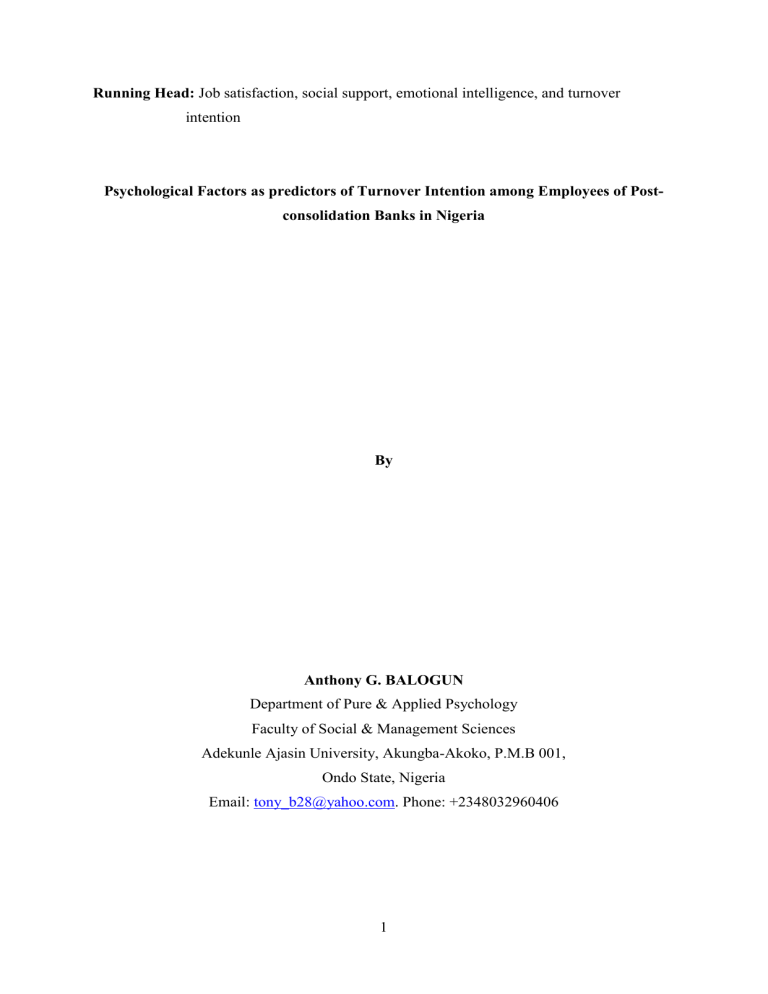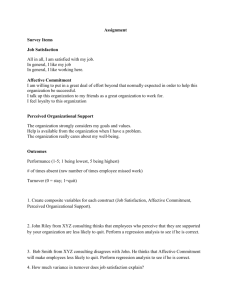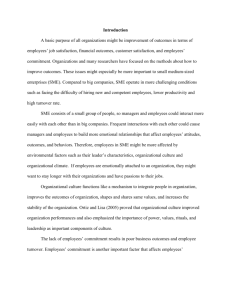Running Head: Job satisfaction, social support, emotional

Running Head: Job satisfaction, social support, emotional intelligence, and turnover intention
Psychological Factors as predictors of Turnover Intention among Employees of Postconsolidation Banks in Nigeria
By
Anthony G. BALOGUN
Department of Pure & Applied Psychology
Faculty of Social & Management Sciences
Adekunle Ajasin University, Akungba-Akoko, P.M.B 001,
Ondo State, Nigeria
Email: tony_b28@yahoo.com
. Phone: +2348032960406
1
Psychological Factors as predictors of Turnover Intention among Bank Employees in
Nigeria
Abstract
Employees’ turnover intention is a major problem facing the banking industry in Nigeria especially in this post-consolidation era. However, earlier studies on employees of postconsolidation banks in Nigeria paid less research attention to this negative job attitude. In particular, little research attention was paid to the influence of the job stress, and emotional intelligence on turnover intention among bank employees in Nigeria. This present study therefore investigated the influence of job stress and emotional intelligence on turnover intention among post-consolidation bank employees in Nigeria. A total of 215 bank employees (106 males; 109 females) from 4 commercial banks in Lagos, Nigeria whose ages ranged from 26 to 55 with mean age of 19 years (SD = 3.19) participated in this study.
Validated scales were used for data collection. Multiple regression analysis was used for data analysis. The result revealed a significant influence of job stress on turnover intention among bank employees. Furthermore, the findings of this study showed that emotional intelligence had a significant influence on turnover intention. Finally, the results revealed a joint influence of job stress and emotional intelligence on turnover intention Therefore, management and human resource personnel of various post-consolidation banks in Nigeria should design intervention strategies using the variables implicated in this study to reduce turnover intention among their employees.
Keywords: Job satisfaction, social support, emotional intelligence, turnover intention, bank employees, Nigeria
2
Psychological Factors as predictors of Turnover Intention among Bank Employees in
Nigeria
INTRODUCTION
The goal of every organisation is to make high productivity, profit (especially if it is a profit-oriented organisation), and render good quality of services. These goals can only be realised with employees’ efforts, supports and contributions. This is because employees are partly responsible for the achievement of organisation’s goals and strategy. But when these employees are thinking of quitting or leaving (i.e., turnover intention) the jobs and the organisation, the aims and objectives of the organisation might not be achieved. This is because turnover intention is a negative job attitude that could results to employees’ turnover
(i.e., loss of employee). Loss of employees may have a detrimental effect on the organisational performance, productivity, and effectiveness. It may also increase the recruitment, selection, and training cost and increase the workload of the remaining employees in the organisation.
There is no place more suitable to study turnover intention than the banking industry in Nigeria. This is because employees’ turnover intention is greater than it’s expected and it has become a major threat to the existence of most of these post-consolidation banks
(Ojedokun, 2008). Bank managements are showing serious concern to this problem because of the deleterious effect it can have on the organisation. According to Fagbohungbe (1993), high level of turnover intention in an organisation indicates that the organisation is seriously ill.
Turnover intention or intention to quit or leave (as used interchangeably in literature) is an individual desire or willingness to quit or leave employer organisation (Tett & Mayer,
1993; Elangovan, 2001). According to Price (2001), it is not just intending to quit the location, but the work role, the job, and also the organisation. Turnover intention has been found to be one of the major determinants of turnover behaviour (i.e., quitting behaviour)
3
(e.g., Price, 2001; Brigham, Castro, & Shepherd, 2007). Therefore, when bank employees’ nurtures turnover intention and this is not checked, it might result to high loss of employees
(i.e., employees’ turnover). Loss of employees or employees’ turnover can cause psychological distress, reduce productivity, quality of service, and increase recruitment cost
(Powell & York, 1992; Mourad & Mustapha, 2007). It can also lead to work overload, mistrust, disruption in workflow, and further turnover (Wagner, 2010; Miller, 2010). These may jeopardize the banking financial system in Nigeria.
Although, considerable amount of researches has been carried out on bank employees in Nigeria, most of these studies paid more research attention to productivity (Oloyede,
2006), organisational commitment (Oluwafemi & Balogun, 2008), occupational burnout
(Ogungbamila, 2010), and fraudulent intent (Owolabi & Babalola, 2011). Meanwhile, less research attention has been devoted to bank employees’ turnover intention. Specifically, there is paucity of empirical studies on the influence of job satisfaction, social support, and emotional intelligence (psychological factors) on turnover intention among bank employees in Nigeria. This is a serious problem to banks because as good as the Central Bank of Nigeria
(CBN) policy reforms are, such policies may not yield the desired results if the employees who are to execute the policy are thinking of quitting the organisation.
Aim
The aim of this study is to investigate the influence of psychological factors (i.e., job satisfaction, social support, and emotional intelligence) on turnover intention among employees in post-consolidation banks in Nigeria. Exploring turnover intention from this direction might help proffer enduring solution to bank employees’ turnover intention in
Nigeria.
4
Job Satisfaction and Turnover intention
Like employees of other organisations, bank employees also give different evaluation of the job they do. The outcome of the evaluation reveals whether the job is satisfying or not.
Job satisfaction is a positive emotional state resulting from the appraisal of one’s job or reactions to work experiences, how workers feel about their jobs, aspect of their jobs, and work situations (Spector, 1997; Landy & Conte, 2004). It is the extent to which a worker feels positively or negatively about the internal and/or external domain of his/her job (Bhuian
& Menguc, 2002) or the contentment and enjoyment employees felt on their job.
The more an employee derives satisfied from this/her job, the more he/she is motivated and committed to the job (Cooper-Hakim & Viswesvaran, 2005; Adebayo &
Ogunsina, 2011). Employees who are satisfied and committed are more likely to attend work, stay with an organisation, be punctual to work, perform well than employees who are not satisfied (Tett & Mayer, 1993; Koslowsky, Sagie, Krausz, & Singer, 1997; Judge, Thoresen,
Bono, & Patton, 2001; LePine, Erez, & Johnson, 2002). Job satisfaction has also been strongly associated with high level of organisational commitment, job performance, and psychological well-being (Judge, et al., 2001; Limbert, 2004).
Many factors contribute to the antecedents of employees’ job dissatisfaction. Some of these factors include but not limited to pay or salary (Banjoko, 1996), unavailability of job, personality, self-esteem, self-efficacy (Judge, Locke, Durham, & Kluger, 1997), life satisfaction (Judge, Locke, Durham, & Kluger, 1998), culture (Sousa-Poza & Sousa-Poza,
2000), equipment (Oladele, 2009). Causes of job dissatisfaction have also been documented in literature. The causes include: transfer inconveniences, poor equipment (Oladele, 2009), low salaries, poor benefits, lack of job security, poor recognition and lack of flexibility in scheduling (Albaugh, 2003). Furthermore, dissatisfaction can result from high emotional
5
exhaustion and burnout, lack of organisational support, and organisational climate (Davey,
Obst, & Sheehan, 2001; Bokti & Talib, 2009; Ahsan, Abdullah, Fie, & Alam, 2009).
In same manner, bank employees’ job dissatisfaction can be triggered by these factors. For example, it has been noted that high job targets or demands, lack of shifting, dual obligation of protecting the banks and its customers, emotional demands, and time pressure
(Ogungbamila, 2010; Ojedokun, 2008, Ogungbamila, 2010), changes in the task, high pressure to balance transaction of the day, increase paper work are common stressors in the banking industry (of Nigeria) that increased the conflicting demands on bank employees.
These stressors may evoke stress, which may in turn result to job dissatisfaction and turnover intention in cases where they exceed bank employees’ coping/adaptive capability.
The connection between job satisfaction and turnover intention has been documented.
For example, Ojedokun, (2008) reported that the higher the level of employees job satisfaction the less think of leaving their job. Similarly, Purani and Sahadev (2007) used a job satisfaction multi-faceted construct as predictor variable and examine its impact on intention to leave among the sales personnel in India. They found that employees with long stay at workplace had higher level of job satisfaction and would not incline to quit. Adeyemo and Afolabi (2007) found a negative association between job satisfaction and withdrawal cognition (intention to quit). In the study of Brough and Frame (2004), it was found that as job satisfaction increases, turnover intention also increases. A direct linked between job satisfaction and turnover intention was also reported by Blacksburg (2000).
Social Support and Turnover Intention
Social support is a supportive or helpful social interactions or exchanges of resources between people in both formal and informal relationships. It refers to the degree to which employees perceived that co-worker offer them support, encouragement and concern
6
(O’D’riscoll & Cooper, 2002; Way & MacNeil, 2006). Co-workers support constitutes an important source of support especially when task accomplishment allows employees to interact with their co-workers.
Social support may take different forms in the workplace, including affective support
(i.e., love, liking and respect), confirmation (i.e. confirming the moral and factual “rightness” of actions and statement), and direct help (e.g. aid in work, giving information, or money)
(Burke, Borcki & Hurley, 1992; Freese, 1999), emotional support, appraisal support, instrumental support and informational support (Beehr, Jex, Stacy & Murray, 2010).
Employees who receive high social support are often more willing to stay with the organisation than their counterparts. This is because social support helps employees to realize their socio-emotional needs (e.g. affiliation, esteem, approval), and signals the availability of aids when needed (Watson, 2000). It also conveys feelings of energy, enthusiasm, and general feelings of positive affect (Watson, 2000). Researches have also indicated that when co-worker or supervisor is supportive of subordinates, this treatment often lead to favourable outcomes for the employee and the organisation such as reduced stress, turnover intention and increase commitment, increase productivity, and enhanced performance (Bakker,
Demerouti, & Schaufeli, 2003; Eisenberger, Stinglahamber, Vandenberghe, Sucharski, &
Rhoades, 2002; Lee, 2004). Therefore, it is expected that bank employees who perceived high social support on their job will be attached, committed, dedicated to their job.
Emotional intelligence and Turnover intention
Although the construct of emotional intelligence is relatively new, it has enjoyed unprecedented attention from scholars in the past two decades. Emotional intelligence is one’s ability to recognize one’s own feelings and others feelings, to differentiate among them, and to use the information to manage one’s thinking and behaviour (Salovey and
7
Mayer, 1990). It is the ability of an individual to understand, adjust, express emotions and adapt to environmental or work pressure (Bar-On, 2002). Generally, emotional intelligence represent encompasses; self-awareness, self-regulation, empathy, motivation, social skills, good character, honesty, impulse control, flexibility, reality testing, and trust (Goleman,
1998).
An employee who is emotionally intelligent is an individual who is optimistic, happy, and have the ability to manage, change, adapt, and solve stressful situations and strong emotions without falling apart but by actively coping with stress (Carmeli, 2003). The fact that some bank employees are academically intelligent may not prevent them from developing negative job attitude like turnover intention. Goleman (1998) and Sjoberg (2001), for instance, identified emotional intelligence as major a psychological factor that influences behavioural and attitudes of workers in different organisations. Being emotionally intelligent also helps a person to focus on the resolution, rather than the reasoning (who is at fault).
Emotionally intelligent individual has the ability and ideas of how avoid dysfunctional emotions and use this in adaptive ways to alleviate feelings of frustration, anger, depression, anxiety and sadness that may activate their intention to quit.
According to past findings, emotional intelligence and turnover intention relationship has been proved to be negative (Goleman, 1998; Hall, 2010). Particularly, Ajay (2009) have supported this argument and through his study he has reported that employees with high emotional intelligence develop less turnover intention. In another study, Carmeli (2003) reported a negative relationship between emotional intelligence and intention to quit. The study of Adeyemo and Afolabi (2007) also lend credence to this argument. Their result showed that low level of emotional intelligence increase the likelihood of withdrawal cognition (thinking of quitting, intention to search, and intention to quit) among female media practitioners. It would therefore be plausible to say that bank employees who have high level
8
of emotional intelligence may be less sensitive to turnover intention. This is because they may have the ability to put themselves in positive affective state (such as not becoming despondent in the face of frustration), take advantage of and regulate their emotions and emotions of others. They may feel more secure in their ability to control and influence life events and pressure from workplace that may trigger turnover intention.
Hypotheses
1.
Job satisfaction, social support, and emotional intelligence will independently significantly predict turnover intention.
2.
Job satisfaction, social support, and emotional intelligence will jointly significantly predict turnover intention
METHOD
Research Design
This study adopted a correlational-survey design. This design is appropriate because the study cut across various unit/department of the banks that participated.
Participants and Procedure
A total of 215 bank employees participated in the study. They were drawn from four commercial banks in Lagos, Nigeria using accidental sampling technique. The participants comprised of 106 (49.30%) males and 109 (50.70) females with ages ranged from 26 to 55 and a mean of age of 19 years (SD = 3.19). Also, 52 (22) were single while 163 (78) were married. Their educational background also varied; 169 (81.7%) had HND/first degree, 37
(17.9%) had M.A./M.Sc./M.Ed. and 9 (0.4%) had SSCE/GCE. In addition, their working experience ranged from 2 to 15 years with a mean of 5.43 years, SD = 2.34.
9
Prior to the administration of the questionnaires to participants, the researcher sought and obtained permission from management of the four commercial banks that participated in the study. The purpose of the study was explained to participants as they were also given assurance of confidentiality and anonymity of their identities and responses. Using accidental sampling technique, 256 questionnaires to employees who consented in such a way that averages of 64 questionnaires were administered per bank. 233 were retrieved but 215 were found usable.
Instrument
Validated scales were used to measure the following:
Job satisfaction was measured with jib satisfaction inventory developed by Akinboye
(2002). The scale has 20 items with a sample item ‘‘the work I do gives me sense of achievement’’. Adeyemo and Afolabi obtained a reliability coefficient of 0.76. A reliability coefficient of 0.74 was obtained in this study. Score above the mean implies that the employee has high job satisfaction.
Social Support: was measured a 6-item subscale of social support from the Job Stress Scale
(Theorell, 1988). Social support was also rated on a 4-point but separate scale (1 = strongly agree; 4 = strongly disagree). Sample items included: My co-worker supports me”. Theorell
(1988) reported Cronbach’s alpha coefficient 0.85. In the present study, a Cronbach’s alpha of 0.70 while a revalidation for the purpose of this study yielded a Cronbach’s alpha of 0.81.
Score above the mean implies that the employee perceived higher social support.
Emotional intelligence: was measured using a 30-item self-report Trait Meta-Mood Scale
(TMMS) developed by Salovey, Mayer, Goleman, Turvey and Palfai (1995). TMMS measures the core areas of emotional intelligence: emotional attention (13 items), emotional clarity (11 items), and mood repair (6 items). Examples of items are: “Feelings give direction
10
to life” (emotional attention), “I am usually very clear about my feelings” (emotional clarity), and “When I become upset I remind myself of all the pleasures in life” (mood repair). The scale is predicated on a 5-point scale (1 = Strongly Disagree; 5 = Strongly Agree). Using
Nigeria sample, Balogun (2012) obtained 0.83 Cronbach’s alphas for the overall scale.
Higher scores suggest that the employee has a high level of emotional intelligence.
Turnover intention: Turnover intention was measured using a 3 item scale developed by
Mobley, Horner and Hollingsworth (1978). The scale measure employees thought of quitting, the intention to search for another job elsewhere and the intention to quit. The scale is scored on a on a 7-point scale ranging from 1 = strongly disagree to 7 = strongly agree. Sample item include: “I think a lot about leaving this organisation”. This author obtained a Cronbach’s alpha of .71 while a revalidation for the purpose of this study yielded a Cronbach’s alpha of
.70. Score above the mean indicates that employee has high turnover intention.
ANALYSIS and RESULTS
Pearson Product Moment Correlation (PPMC) was used to test the relationship among the study variables. The results are presented in table
Table 1: Mean, SD, and Inter-variable correlations
Variables 1 2 3 4 6 7 Mean SD
1. Age
2. Gender
3. Job satisfaction
4. Social support
1
.75**
-.18** 1
.60** -.13*
-.11*
1
.57** 1
5. Emotional I .08 -01 -.04 -.06 1
6. Turnover intention -.32** -.03 -.22* -.34** -.32** 1
24.12
-
13.21
-
15.45 3.46
17.22 8.54
81.34
14.55
14.34
4.39
Note: ** P< 0.01 (2 tailed) *P< 0.05 (2-tailed) N = 213
Key: Emotional I. = Emotional Intelligence
The result in table 1 showed significant positive relationship between job satisfaction and turnover intention [r (213) = 0.22, p < 0.05], implying that the higher the job satisfaction of bank employees, the lower their desire to quit. The result also showed that social support had significant negative relationship with turnover intention [r (517) = -.34; p < 0.01]. This
11
implies that bank employees who reported high social support showed lower tendency of turnover intention. Similarly, the result revealed a significant negative relationship between emotional intelligence and turnover intention [r (213) = -0.32, p < 0.01]. This implies that the higher the emotional intelligence of bank employees, the lower their turnover intention.
To test the hypotheses 1 and 2, a multiple regression was conducted. The result is presented in table 2.
Table 2: Summary of Multiple Regression Analysis Showing the Independent and Joint
Influence of Job Satisfaction, Social Support, and Emotional Intelligence to Turnover
Intention
Variables Beta t P R
R²
F P
Job satisfaction
Social Support
Emotional Intelligence
Note: *P < 0.05, **P < 0.01, N = 215
-0.30
* -5.43
-0.25* -3.12 < 0.05
0.62 0.59 23.43* < 0.05
-0.36
** -5.71 < 0.01
Results in table 2, showed that job satisfaction significantly predicted turnover intention (β = 0.30; t = 5.83; p < 0.05). This implies that bank employees feel high level of job satisfaction reported low turnover intention. Similarly, social support significantly predicted turnover intention of bank employees (β = -0.25; t = -3.12; p < 0.05). This indicates that bank employees who perceive high social support on their job reported low turnover intention. Emotional intelligence also significantly predicted turnover intention (β = -0.36; t =
-5.88; p < 0.01). This implies that bank employees who have high level emotional intelligence showed lower tendency to quit their job. Therefore, hypothesis 1 was confirmed.
Lastly, as indicated in table 2, all the independent variables when pulled together (i.e., job satisfaction, social support, and emotional intelligence) yield a multiple R of 0.62 and R² of 0.59 [F (1, 211) = 23.43; p < 0.05]. This is an indication that all the independent variables
12
contributed 58% of the variance in turnover intention. Meanwhile, other variables not considered in this study therefore accounts for 41%. Hence, hypothesis 2 was confirmed.
DISCUSSION
This study examined the influence of job satisfaction, social support, and emotional intelligence on turnover intention of bank employees in Nigeria. Results of this study showed that job satisfaction significantly predicted turnover intention. This result is in line with the findings of Ojedokun, (2008) who reported that the higher the level of employees’ job satisfaction the less think of leaving their job. A possible explanation could be that bank employees who are satisfied with their job are always committed and involvement in their job. In Nigeria, job dissatisfaction may not always or necessarily lead to intention to quit, due to the high poverty and unemployment rate in the country. Therefore everybody, including the bank employees, tend to hold firm to what they have got (employment) because new and good jobs are not easy to come by. The study also supported the findings of Purani and
Sahadev (2007) and Adeyemo and Afolabi (2007). They found that employees with long stay at workplace had higher level of job satisfaction and would not incline to quit.
That social support significantly predicted turnover intention concurred with the findings of Bakker, Demerouti, Schaufeli, and Demerouti (2003) and Brough and Frame
(2004) that found negative association between social support and turnover intention. A possible explanation could be that bank employees who receive social support such as such as love, respect, aid at work, information, and money from colleagues or supervisor are more dedicated and committed to their work and are less inclined to leave the organisation than employees who perceive low social support on their job. This finding supported Eisenberger,
Stinglahamber, Vandenberghe, Sucharski, and Rhoades (2002) who reported that employees who perceived low levels of perceived organisation, supervisors, and colleagues’ supports are
13
less likely to be committed to the organisation and as a result, are more likely to quit their organisation.
That emotional intelligence significantly predicted turnover intention corroborated with the findings of Adeyemo, et al., (2007) who found a significant negative association between emotional intelligence and withdrawal cognition. An important explanation could be that bank employees possessed the ability to recognize their own feelings, others feelings, to differentiate among them, use the information to manage one’s thinking and behaviour, understand, adjust, express emotions and adapt to environmental or work pressure. Moreover, they are able to adept at putting themselves in positive affective states to avoid dysfunctional emotions and use them in adaptive ways to alleviate the feeling of frustration than bank employees with low emotional intelligence (Goleman, 2004). This will make them report low level of turnover intention than their counterparts. This finding gained support from the works of previous researcher who reported that the higher the level of emotional intelligence of an individual the less they desire to quit their job (Carmeli, 2003; Ajay, 2009).
Job satisfaction, social support, and emotional intelligence jointly significantly predicted turnover intention. This is an indication that the combined influence of job demands, job satisfaction, social support, and emotional intelligence together has stronger association with turnover intention. An explanation for this finding is that it is easier and possible for bank employee who is not satisfied with his/her job, possesses low level of emotional intelligence and perceived low social support on their job to will show higher tendency to quit.
Conclusion and Implications
The results of this study showed that job satisfaction, social support, and emotional intelligence significantly exert independent and joint influence bank employees’ turnover
14
intention in Nigeria. Findings from this study implicate the need for bank management and human resource personnel to design interventions programmes that can help increase their employees level of job satisfaction, increase or maintain high job autonomy, and good social support that would monitor job demands and detects early warning signs of occupational stress.
The findings of this study also have practical implications for reviewing and updating
Nigeria banking reforms and training manuals, specifically in relations to recruitment, selection, placement, and training of bank employees. It is therefore suggested that bank management should include measure of emotional intelligence as part of assessment tools during recruitment. Emotional intelligence training should also form an important area of concentration during training and development exercises of bank personnel.
Lastly, findings from this study would serve as a reference point and stimulate more research in this direction among organisational attitudes researchers and other researchers that are interested in turnover intention among bank employees.
Limitations and Future Direction
Some limitations were noted in this study. Firstly, the study only made use of only
215 participants which may not be enough for genaralisation. Secondly, participants were drawn from only four commercial banks in Lagos, Nigeria. Thirdly, data might be open to response set because data were collected using self-report questionnaires.
Other researcher should use larger sample size across various banks in Nigeria. The moderating role of emotional intelligence on the relationship between job stress and turnover intention should be investigated. Other researcher may also embark on comparative study.
Moreover, the influence of other variables such as work-family conflict and organisational climate on turnover intention of bank employees’ should be considered in future research.
15
REFERENCES
Adebayo, S. O. & Ogunsina, S. O. (2011). Influence of Supervisory Behaviour and Job Stress on Job Satisfaction and Turnover Intention of Police Personnel in Ekiti State. Journal of management and Strategy, 2(3), 13-20.
Adeyemo, D. A., & Afolabi, J. O. (2007). Influence of sexual harassment, occupational stress, emotional intelligence and job satisfaction on withdrawal cognition of female practitioners in Oyo state, Nigeria. Pakistan Journal of Social Sciences, 4(4) , 639
646.
Ahsan, N., Abdullah, Z., Fie, D. Y. G., & Alam, S. S. (2009). A study of job stress on job satisfaction among university staff in Malaysia: empirical study. European Journal of
Social Sciences, 8(1), 121-131.
Ajay, K. J. (2009). Exploring the relative relevance of organizational citizenship behaviour and emotional intelligence. Journal of the Indian academy . 35 , 87-97.
Akinboye, J. O. (2002). Code of conduct in handling sexual workplace. In J. O. Akinboye
(Ed.), Psychological principle for success in life and workplace Ibadan, Sterling
HordenPublishers (Nigeria) Limited.
Albaugh, J. (2003). Keeping nurses in nursing: the profession’s challenge for today. Urologic
Nursing , 23, 193-199.
Bakker, A. B., Demerouti, E., & Schaufeli, W. B (2003). Dual processes at work in a call centre: an application of the job demands-resources model. European Journal of
Work and Organisational Psychology, 12(4) , 393-417.
Balogun, A. G. (2012). Dimensions of job stress and emotional intelligence as predictors of turnover intention among bank employees in Lagos. Nigeria. Unpublished dissertation, Adekunle Ajasin University, Akungba-Akoko, Nigeria.
Banjoko, R.O. (1996). Organizational behaviour and motivation. Lagos: Salek Education
Publishers.
Bar-On, R. (2002). The emotional intelligence inventory (EQ-1): Technical Manual.
Beehr, T. A., Jex, S. M., Stacy, B. A., & Murray, M. A. (2000). Work stressors and coworker support as predictors of individual strain and job performance. Journal of
Organizational Behaviour, 21 , 391-405.
Bhuian, S. N., & Menguc, B. (2002). Evaluation of Job Characteristics, Organizational
Commitment and Job Satisfaction in an Expatriate, Guest Worker, Sales Setting
Journal of Personal Selling and Sales Management, 22, 1-12.
.
Blacksburg, V. (2000). An empirical study of organisational justice as moderator of the relationship among leader-member exchange and job satisfaction, organisational commitment, and turnover intention in Lodging Industry. Unpublished thesis,
University of Hyung-Ryond, Lee.
16
Bokti, N. L. M., & Talib, M. A. (2009). A preliminary study on occupational stress and job satisfaction among male navy personnel at a naval based in Lumut, Malaysia. The
Journal of International Social Research, 2(9), 299-306.
Brigham, K. H., Castro, J. O. D., & Shepherd, D. A. (2007). A person-organisation fit model of owner-managers’ cognitive style and organisational demands.
Industrial Journal, 5(2) , 1042-2587.
The Service
Brough, P., & Frame, R. (2004). Predicting police job satisfaction and turnover intentions:
The role of social support and police organizational variables.
Psychology, 33(1 ), 8-16.
New Journal of
Burke, M. J., Borcki, C. C., & Hurley, A. E. (1992). Conceptualizing psychological climate in a retail service environment: a multiple stakeholder perspective.
Applied Psychology, 77 , 717-729.
Journal of
Carmeli, A. (2003). The relationship between emotional intelligence and work attitudes, behaviour and outcomes. Journal of Management Psychology, 18, 788-813
Cooper-Hakim, A., & Viswesvaran, C. (2005). The construct of workplace commitment: testing an integrative framework. Psychological Bulletin, 131(2), 241-259.
Davey, J., Obst, P., & Sheehan, M. (2001). Demographic and workplace characteristics which add to the prediction of stress and satisfaction within the police workplace.
Journal of Police and Criminal Psychology, 16(1), 29-39.
Eisenberger, R., Stinglahamber, F., Vandenberghe, C., Sucharski, I. L., & Rhoades, L.
(2002). Perceived supervision support: contributions to organisational support and employees’ retention. Journal of Applied Psychology, 82 , 578-589.
Elangovan, A. R. (2001). Causal ordering of stress, satisfaction, and commitment, and intentions to quit: a structural equation analysis. Leadership and organisational development Journal, 22(4), 159-165.
Freese, M., (1999). Social support as a moderator of the relationship between work stressors and psychological dysfunction: a longitudinal study with objective measures. Journal of Occupational Health Psychology, 4(3), 179-192.
Galletta, M., Portoghese, I., & Battistelli, A. (2011). Intrinsic motivation, job autonomy and turnover intention in Italian healthcare: the mediating role of affective commitment.
Journal of Management Research, 3(20 ), 1-19.
Goleman, D. (1998). Working with emotional intelligence. New York: Bantam Books.
Hall, E. D. M. (2010). Relationship between emotional intelligence of managers and voluntary turnover intentions of employees/followers. Retrieved March 11 th
,
2011 from http://gradworks.umi.com/34/17/3417610.html.
17
Judge, T. A., Locke, E. A., & Durham, C. C. (1997). The dispositinal causes of job satisfaction: a core evaluation approach.
151-188.
Research in Organisation behaviour, 19(1),
Judge, T. A., Locke, E. A., Durham, C. C., & Kluger, A. N. (1998). Dispositional effects on job and life satisfaction: the role of core evaluation. Journal of Applied Psychology,
83(1), 17-34.
Judge, T. A., Thoresen, C. J., Bono, J. E., & Patton, G. K. (2001). The job satisfaction-job performance relationship: a qualitative and quantitative review. Psychological
Bulletin, 127(3), 376-407.
Koslowsky, M., Sagie, A., Krausz, M., & Singer, A. H. (1997). Correlates of employee lateness: some theoretical consideration. Journal of Applied Psychology, 82(1), 79-88.
Landy, F. J., & Conte, J. M. (2004). Work in 21 st century, an introduction to individual &
Organisational psychology. New York: McGraw Hill.
LePine, J. A., Erez, A., & Johnson, D. E. (2000). The nature and dimensionality of organisational citizenship behaviour: a critical review and a meta-analysis.
Journal of
Applied Psychology, 87(1), 52-65.
Limbert, C. (2004). Psychological well-being and job satisfaction amongst military personnel on unaccompanied tours: The impact of perceived social support and coping strategies. Military Psychology, Lawrence Erlbaum Associates.
Miller, Y. (2010). Labour turnover and its impact on customer service and success of restaurant in London. Retrieved July 6 th
, 2010 from http://www.articleblast.com..
Mobley, W. H., Horner, S. O., & Hollingsworth, A. T. (1978). An evaluation of precursors of hospital employees’ turnover.
Journal of Applied psychology, 63, 408-414.
Mustapha, A. & Mourad, M. (2007). Employee turnover and retention strategies: evidence from Saudi companies. International Review of Business Research papers,
3 (3), 1-16.
O’Driscoll, M. P., & Cooper, C. L. (2002). Job-related stress and burnout. In P. Warr
(Ed), psychology at work (pp. 203-228). London: Penguin Books.
Ogungbamila, B. (2010). Effect of felt obligation on occupational burnout among employees of post-consolidation banks in Nigeria. Ife Psychologia, 18(2), 137 -149.
Ojedokun, A. O. (2008). Perceived job insecurity, job satisfaction and intention to quit
AfricanJournal for the Psychological Study of Social Issues, 11(2), 204-220
Oladele, C.J. (2009). The police personality, The Nation Newspaper, April 4, 17-22.
Oloyede, D. O. (2006). Impact of work-induced stress on perceived workers’ productivity in banking industry in Nigeria. Ife Psychologia, 14(1), 15-25.
18
Oluwafemi, O. J. & Balogun, S. K. (2008). Predicting commitment forms from psychological contract breach and violation among survivors of merged banks in
Nigeria. African Journal for the Psychological Study of Social Issues, 41(2),
185-201.
Owolabi, A. B. & Babalola, S. S. (2011). Effect of perceived inequality and perceived insecurity on fraudulent intent of bank employees in Nigeria. Europe’s Journal of
Psychology, 7(1), 99-111.
Powell, M.J. & York, R.O. (1992). Turnover in county public welfare agencies. Journal of
Applied Social Science, 16(2), 111–127.
Price, J. I. (2001). Reflections on the determinants of voluntary turnover. International
Journal of Manpower, 22(7) , 624-660.
Salovey, P. & Mayer, J. D. (1990). “Emotional intelligence”. Imagination, Cognition and
Personality, 9(3), 185-211.
Salovey, P., Mayer, J. D., Goldman, S. L., Turvey, C., & Palfai, T. P. (1995). Emotional attention, clarity, and repair: Exploring emotional intelligence using the Trait
Meta Mood Scale. In J. W. Pennebaker (Ed.), Emotion, disclosure, and health
12-154). Washington, DC: American Psychological Association.
(pp.
Sjoberg, L. (2001). Emotional adjustment and life adjustment: A validation study. Working
Paper Series in Business Administration. Retrieved from http://swoba.hhs.se/sse/efi on October 10 th , 2006.
Spector, P. E. (1997). Job satisfaction: application assessment, cause, and consequences.
Thousand Oak, California: Sage Publication.
Tett, R. P., & Mayer, J. P. (1993). Job satisfaction, organisational commitment, turnover intention and turnover, path analysis based on meta-analytical findings. Personnel
Psychology, 46, 259-293.
Theorell, T. (1988). The demands-control-support model for studying health in relation to the work environment: an interactive model. In K. Orth-Gomer & N. Schnelderman
(Eds.), Behavioural medicine approaches to cardiovascular disease , (pp.69-85).
Mahwah, NJ: Erlbaum Associates Toronto, Canada: Multi health System.
Wagner, C. M. (2010). Predicting nursing turnover with catastrophe theory. Journal of
Advanced Nursing, 66, 2071-2084.
Way, M., & MacNeil, M. (2006). Organisational characteristics and their effect on Health.
Nursing Economics, 24(2), 67-77.
19







